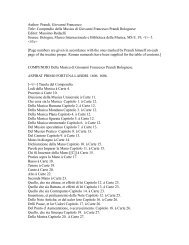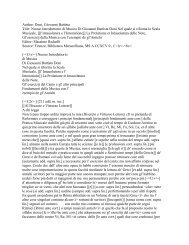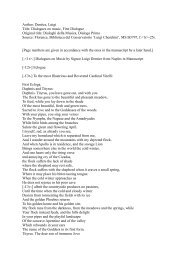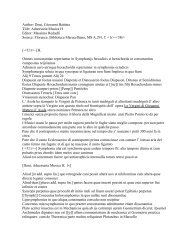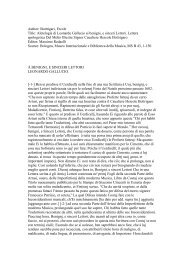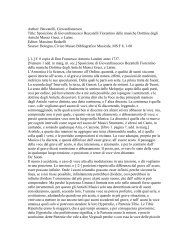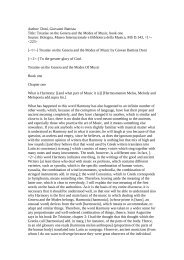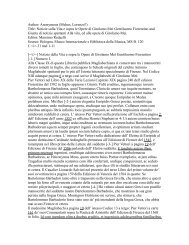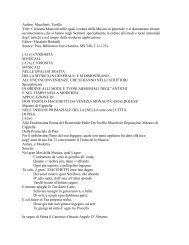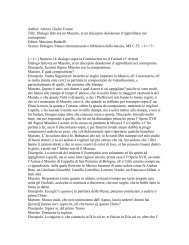other notes, which are not marked with any <strong>of</strong> this sort <strong>of</strong> Characters, are common to allthe Genera. This sign which you see marked <strong>in</strong> this way [signum] <strong>in</strong> the EnharmonicGenus was <strong>in</strong>vented by Zarl<strong>in</strong>o, who, <strong>in</strong> truth, could not f<strong>in</strong>d a better sign and way towrite it. Although Vicent<strong>in</strong>o has shown the procedure to compose <strong>in</strong> that Genus<strong>in</strong>dependently <strong>of</strong> the others <strong>in</strong> his Treatise, nevertheless, if there is not an <strong>in</strong>strumentespecially built with all those Notes which he shows, it will never be possible to let thatGenus be heard <strong>in</strong>dependently <strong>of</strong> the others.Pupil: To tell the truth, it seems to me that the second order is very difficult, and if theComposers absta<strong>in</strong>s from adopt<strong>in</strong>g [-f.34r-] the particular notes <strong>of</strong> other Genera, I believethat he will not be able to compose <strong>in</strong> that one <strong>in</strong> a way that is mean<strong>in</strong>gful andaccomplished.Pupil: What you say is true. Although some composers have presumed to be able to do it,it was not true, they were mistaken, and they have written their composition with melodicturns so strange and far removed from the Chromatic forms, that it was impossible tolisten to them, so annoy<strong>in</strong>g they were. What is worse, they have wanted, to top it all, totry their hand at the third Genus, ma<strong>in</strong>ta<strong>in</strong><strong>in</strong>g that it was possible to write any sort <strong>of</strong>Composition <strong>in</strong> any Genus, without any support from the other particular notes found <strong>in</strong>other Genera. However, s<strong>in</strong>ce they could not do it without them, and <strong>in</strong>sist<strong>in</strong>g <strong>in</strong> theirobst<strong>in</strong>ate belief that they could write them, they ended up writ<strong>in</strong>g a Composition soobnoxious and which sounded so strange to the Ear, that one could not hear anyth<strong>in</strong>gworse. I state that when one talks about writ<strong>in</strong>g <strong>in</strong> the last two Genera without employ<strong>in</strong>gother notes which belongs particularly to another Genus and order, one talks aboutsometh<strong>in</strong>g that is impossible to achieve. However, even if some Composition could bewritten us<strong>in</strong>g these notes, it does not turn out to be for this reason that that Composition isrightly <strong>in</strong> the Chromatic or Enharmonic Genus, as they imag<strong>in</strong>e. Once, I did share theirvery op<strong>in</strong>ion, and when I did follow it to its furthest consequences, I found that I wasmistaken and I have realised through experience how far removed from the truth I was.Therefore, it is not possible to employ and adopt any other Genus than the Diatonic,either by itself, or mixed. The other Genera cannot produce any pleasure to the Ear, ifthey are not accompanied by the Diatonic, with those boundaries and rules which arerequired. In that case, they produce great sweetness and marvellous pleasure. This is allthat I wanted to tell you about the Genera <strong>in</strong> general. However, if you want to ga<strong>in</strong> deeperknowledge <strong>of</strong> this matter, consult the most learned Zarl<strong>in</strong>o and [-f.34v-] Vicent<strong>in</strong>o, andthere you will f<strong>in</strong>d all that you desire to know [signum].Teacher: It is left to me now to tell you a few words <strong>of</strong> warn<strong>in</strong>g and I am about to tell younoth<strong>in</strong>g but the pure truth. Through my long activity as a musician <strong>in</strong> various parts <strong>of</strong>Italy, I have come to learn through true experience that if a man is not very popular <strong>in</strong> theWorld, it will be difficult that his works are adopted and embraced, even if they are full <strong>of</strong>every doctr<strong>in</strong>e. You will see very <strong>of</strong>ten that somebody who is <strong>in</strong>ferior to you and cannotreach your level will be favoured nevertheless and elevated by some Pr<strong>in</strong>ce or by somemiddle man, so that he will be considered the most able man <strong>in</strong> the World. The ignorantpopulace will applaud him and he will be celebrated him as knowledge personified. I amnot referr<strong>in</strong>g just to this discipl<strong>in</strong>e, but to any other as well. As Zarl<strong>in</strong>o says on thismatter, sometimes a public notoriety and fame has such a strong effect, not only on thepopulace, but also those who are learned and judicious, that nobody dares speak outaga<strong>in</strong>st common op<strong>in</strong>ion even if they understand and consider it as very false. On thecontrary, they feel the need to be quiet and say noth<strong>in</strong>g. In fact, should you or any other
person talk aga<strong>in</strong>st him perchance with very well-grounded reasons, you would be calledand accused publicly by everyone <strong>of</strong> be<strong>in</strong>g a liar and a nasty gossip. I say more, the wholeWorld will turn aga<strong>in</strong>st you, so widespread is Malice nowadays. [-f.35r-] The will beg<strong>in</strong>to persecute you, not only by speak<strong>in</strong>g ill <strong>of</strong> your words and denigrat<strong>in</strong>g them <strong>in</strong> everypart, but they will try also to collect them <strong>in</strong> a despicable way from every place toeradicate them, and to abuse them more completely, they will sell them to the grocers sothat they me be seen publicly be<strong>in</strong>g used as wrapp<strong>in</strong>g paper for kippers and pilchards. Owhat a diabolic thought, o the malice <strong>of</strong> some abom<strong>in</strong>able men! To take away honour andfame from someone is a mortal s<strong>in</strong>. It is a div<strong>in</strong>e teach<strong>in</strong>g to do good to the next man.What good comes from drown<strong>in</strong>g the fruits <strong>of</strong> those sleepless nights and the labours <strong>of</strong>that able person? In short, there is noth<strong>in</strong>g more opposed to the rational creature thatliv<strong>in</strong>g aga<strong>in</strong>st reason. Almost as irrational persons they must rest assured that they willpay for this at the right time and <strong>in</strong> the right place. Perhaps, they will be an example forothers like them, as I have seen <strong>of</strong>ten, who have fallen out <strong>of</strong> favour with notable disgrace<strong>of</strong> their own. However, let us let them go, let them talk and spit as much evil as theywant, we will try to do good to the next man, so that we are men towards fellow menrather than rapacious wolves. [signum] Because up to know we have dealt with the parts<strong>of</strong> the <strong>Music</strong> <strong>in</strong> order to acquire knowledge <strong>of</strong> the practice <strong>of</strong> composition with thosedemonstrations and dist<strong>in</strong>ctions which seemed to me to be appropriate as I am used togood pr<strong>in</strong>ciples, but we have said noth<strong>in</strong>g as to how the Intellect has to build a habitwhich is well suited to the Science or Art, the consequence <strong>of</strong> this is that first <strong>of</strong> all onehas to perfect all those particular matters which perta<strong>in</strong> to Art, and then, adopt<strong>in</strong>g a good,attractive and learned style, and, when he has done this, he will be able to present himselfand appear <strong>in</strong> front <strong>of</strong> the World with his own compositions. However, if you actdifferently, [-f.35v-] you will be considered as one <strong>of</strong> those learned <strong>Music</strong>ians. Now, asnobody could arrive to the nab <strong>of</strong> this reason<strong>in</strong>g, s<strong>in</strong>ce every Composer has his own whimand fancy, and it is impossible to arrive to honour them all, and s<strong>in</strong>ce nowadays we are somany and so different styles and procedures <strong>of</strong> composition that it is a marvel to behold, Isay that you will be <strong>in</strong> a position to choose the one that you prefer and you like the most,or to follow the one that comes more natural to you, as long as you write a compositionwhich is good and learned, and, most <strong>of</strong> all, as long as you avoid arbitrary licences andyou are rather more respectful <strong>of</strong> the rules than <strong>in</strong>cl<strong>in</strong>ed to break them. You should payattention not to make your compositions awkward and full <strong>of</strong> every k<strong>in</strong>d <strong>of</strong> difficulties,both with contradictory notational features, as well as with the <strong>in</strong>vention <strong>of</strong> extravagantpassages to overload the m<strong>in</strong>ds <strong>of</strong> the s<strong>in</strong>gers, because you will ga<strong>in</strong> little praise and theywill not be performed more than once, so that it will be very probable that thosementioned works <strong>of</strong> yours will fall <strong>in</strong>to a perpetual sleep <strong>in</strong> a corner. You must applyevery diligence <strong>in</strong> avoid<strong>in</strong>g tedious long-w<strong>in</strong>dedness, and, especially, you must take carenot to fall <strong>in</strong>to the trap <strong>of</strong> those many and many po<strong>in</strong>tless repetitions, which will producethe same result, because they provoke great boredom and annoyance <strong>in</strong> those who areknowledgeable. When you employ repetitions, they must be varied <strong>in</strong> the procedure <strong>of</strong> thesubject, and must not be many. However, I cannot give you an absolute <strong>in</strong>struction andone that is totally resolved, because such attractiveness might occur <strong>in</strong> the words, that willrequire to be repeated several times to give pleasure to the listeners. However, I mean tosay that you must observe a balanced way <strong>of</strong> writ<strong>in</strong>g, without lett<strong>in</strong>g your self betransported by a vane desire to write too much without a well founded pr<strong>in</strong>ciple [signum].Moreover, while attractiveness <strong>in</strong> your style is a good th<strong>in</strong>g, to write ornately withoutdoctr<strong>in</strong>e is silly. Not every entic<strong>in</strong>g feature suits every type <strong>of</strong> <strong>Music</strong>, but every soliddoctr<strong>in</strong>e is appropriate to every k<strong>in</strong>d <strong>of</strong> <strong>Music</strong>. Far-fetched <strong>in</strong>ventions without


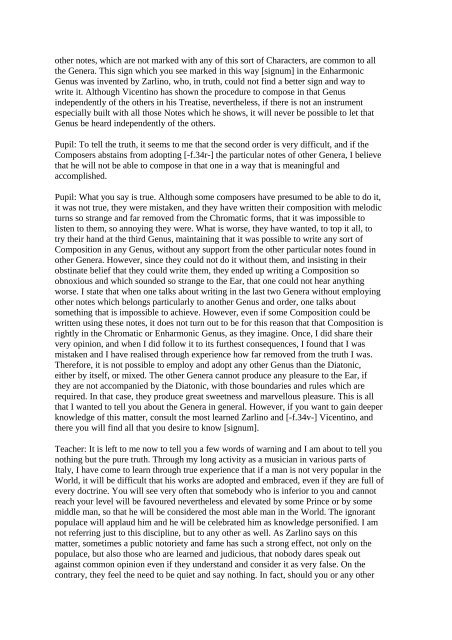
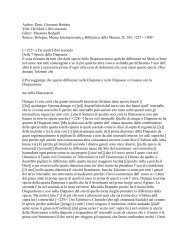
![Doni, Giovanni Battista Title: Trattato Dei Tuoni o [[Harmonie de]]](https://img.yumpu.com/45461005/1/190x245/doni-giovanni-battista-title-trattato-dei-tuoni-o-harmonie-de.jpg?quality=85)
